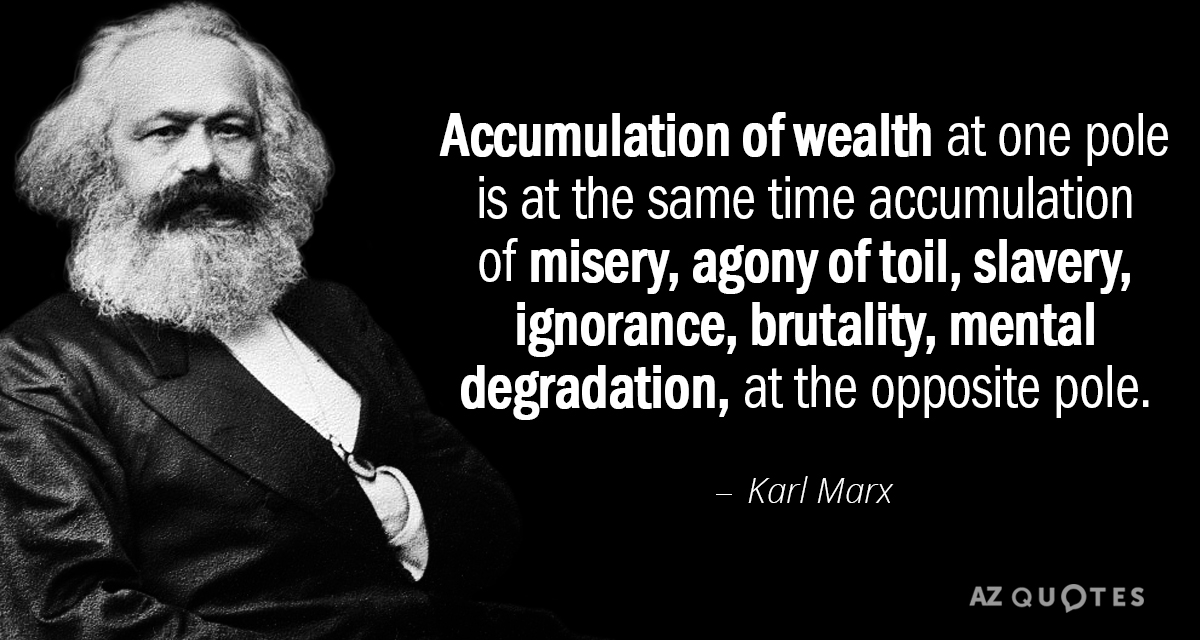Capitalism v. Socialism: Material Convenience v. Ethics/Morality
Audio link
ayn rand
->

karl marx->

I choose to label capitalism, in the most generous light of this pejorative, an “amoral morality”, since the individual is not necessarily subject to the aesthetics of their social environs. I choose to call socialism, benign despotism, because whatever good intentions and ends it seeks, there is the formal or informal imposition of values on the whole or ‘minority’ by others.
An argument for socialism would be the closing of aggrandizing loopholes for the leveraged few over the disadvantaged rest. The counter-argument for capitalism would be the genius and initiative, no matter the status of its origin, should be encouraged instead of repressed for non-manifested, intangible ends.
My personal experiences have seen (in another generously meant pejorative) the “benevolent despotism” of parental control and direction to my own questioning the relevance and facility of experiences and ways of the past being the arbiter of what could be done in the present or envisioned for the future.
Even if the argument is made that there are more indefinite to limitless options to the abstractions of the intangible over the minimally regulated access of material acquisition for the tangible, there is the ‘Elephant in the room’ counter-argument that prime examples of intangible abstractions, such as religion and other dogmas, have become a masterful instrument of repressive authoritarianism due to the administrative compulsion of creating a sustaining organized institutional culture for those intangibles. But since such instruments of repression are usually in a tangible, institutional hierarchy, there is a tangible perception of those levers of authority. In contrast, those minimally regulated, acquisitioned accesses to the means of control and thus authority over others can exist in a more nebulous, non-transparency of definitive identification.
One could argue the irrelevancy of ethical and moral aesthetics as non-practical and inexpeditious impediments to feasibly logical possibilities, even though the feasibly logical as an intangible idea and ends can be an existential adversity to the manifestly tangible cultural and social milieu.
This seeming mutual exclusivity of benefits for the adherents to the capitalist or socialist ethos, raises the question of boths ontology beyond their anthropomorphic origins. Could it be that there are two different Yin/Yang ontologies in cosmic existence? One would be for discovery and efficiencies, while the other would be for administrative integration. As symbiotic and synergistic partners they would produce an increasingly more efficient systemic operation. In a lesser symbiotic and synergistic relationship, particularly in more tangible systems, there comes into play a cannibalistic relation, in which the more sustainably organized system would prevail.
This would endanger the systems whose aesthetics may have more populist favorability, but whose organizational sustainability is lacking (former urban industrial-job and coal mining communities, and ‘not-too big-to-fail’ banks). The loss of the cultures cannibalized by the more operationally organized systems may not be so easily accepted socially and politically by those unwilling to adopt or adapt to the cannibalizing structures, thus establishing an inherent dysfunctional inefficiency as part of the predominating structure’s operation. The ‘management’ of such inefficiencies will engender the derived off-shoots of the predominant system's reforming, rehabilitating or repressive manifestations to bring the Yin-Yang incongruence back to some form of systemic, operational equilibrium as a legacy and organic, systemic fixture of the contrasting, contention between the two wills of aspiration .
No comments:
Post a Comment